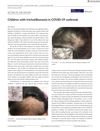 5 citations,
October 2022 in “Cureus”
5 citations,
October 2022 in “Cureus” Older, obese people with many COVID-19 symptoms are more likely to suffer from severe long-term COVID-19 effects.
 August 2024 in “Orvosi Hetilap”
August 2024 in “Orvosi Hetilap” Vaccination helps prevent long-term COVID-19 symptoms.
May 2022 in “International Journal of Dermatology” A woman experienced sudden hair graying and loss after a COVID-19 vaccine, which improved with treatment.
1 citations,
March 2022 in “Irish Journal of Medical Science” Men with androgenetic alopecia and hypertension may experience more severe COVID-19.
Finasteride may help reduce COVID-19 infection by altering a key gene.
 November 2022 in “Journal of the Endocrine Society”
November 2022 in “Journal of the Endocrine Society” A woman with ectopic Cushing's syndrome and COVID-19 passed away despite treatment.

Icosapent ethyl may help treat long-lasting symptoms after COVID-19.
 6 citations,
December 2023 in “Lancet. Infectious diseases/The Lancet. Infectious diseases”
6 citations,
December 2023 in “Lancet. Infectious diseases/The Lancet. Infectious diseases” SIM01 significantly reduced post-COVID symptoms and is safe.
 70 citations,
July 2020 in “Pharmacological Reports”
70 citations,
July 2020 in “Pharmacological Reports” Cepharanthine, a Japanese hair loss drug, shows promise as a COVID-19 treatment but needs more testing.

Lower LDL-c levels predict higher COVID-19 mortality.
 36 citations,
July 2020 in “Frontiers in Medicine”
36 citations,
July 2020 in “Frontiers in Medicine” Spironolactone might help protect against severe lung problems in COVID-19 patients.
 3 citations,
October 2022 in “Hormone and Metabolic Research”
3 citations,
October 2022 in “Hormone and Metabolic Research” Male hormones may increase the severity and death rates of COVID-19.
 5 citations,
May 2021 in “Journal of Cosmetic Dermatology”
5 citations,
May 2021 in “Journal of Cosmetic Dermatology” More children are showing signs of hair-pulling disorders during the COVID-19 pandemic due to stress and lack of social interaction.
24 citations,
June 2020 in “Journal of the American Academy of Dermatology” Patients reduced searches for dermatology issues during COVID-19, indicating a need for better telehealth services.
5 citations,
May 2020 in “Journal of the American Academy of Dermatology” AGA might indicate higher risk for severe COVID-19.
4 citations,
January 2022 in “OAlib” Antioxidants might help with Long Covid by addressing oxidative stress and nutrient imbalances.
 125 citations,
August 2020 in “Frontiers in Immunology”
125 citations,
August 2020 in “Frontiers in Immunology” Men generally have more severe COVID-19 cases and higher death rates than women due to biological differences.
 8 citations,
October 2022 in “Medicina-lithuania”
8 citations,
October 2022 in “Medicina-lithuania” Patients with long COVID after Omicron had fewer hospitalizations and milder symptoms but more fatigue, insomnia, and cough compared to those with Delta.
 June 2022 in “Journal of the turkish academy of dermatology”
June 2022 in “Journal of the turkish academy of dermatology” During the COVID-19 pandemic, some skin conditions became more common while others decreased.
 5 citations,
January 2022 in “Journal of the European Academy of Dermatology and Venereology”
5 citations,
January 2022 in “Journal of the European Academy of Dermatology and Venereology” The Covishield COVID-19 vaccine caused skin-related side effects in 1.23% of the people vaccinated in the study from India.
 17 citations,
June 2020 in “British Journal of Dermatology”
17 citations,
June 2020 in “British Journal of Dermatology” Oral mTOR inhibitors often cause skin and hair side effects but usually don't require stopping treatment.
26 citations,
June 2020 in “The Journal of Allergy and Clinical Immunology In Practice” A patient developed a severe skin reaction and died after taking hydroxychloroquine for COVID-19.
91 citations,
July 2020 in “JAMA Dermatology” Minoxidil can improve hair growth in some patients with woolly hair due to LIPH variants, with varying responses and mild side effects.
13 citations,
September 2009 in “Heart & Lung” Kawasaki's disease can occur in adults and should be considered with specific symptoms and high ferritin levels.
 4 citations,
May 2021 in “medRxiv (Cold Spring Harbor Laboratory)”
4 citations,
May 2021 in “medRxiv (Cold Spring Harbor Laboratory)” Long-lasting COVID-19 symptoms like fatigue and breathing difficulties can persist for over 60 days, requiring ongoing care.
 February 2024 in “PubMed”
February 2024 in “PubMed” More people experience hair loss after recovering from COVID-19 in hospitals than in outpatient settings.
 December 2023 in “International journal of statistics and probability”
December 2023 in “International journal of statistics and probability” Blood type affects COVID-19 infection rates differently in Europe and Africa.
 1 citations,
December 2022 in “BMC Public Health”
1 citations,
December 2022 in “BMC Public Health” Long-term effects of COVID-19 can vary over time and are more likely in certain age and gender groups, while race, income, and education levels have little to no impact. Ongoing medical care is needed due to potential complications.
 October 2022 in “Journal of experimental and clinical medicine”
October 2022 in “Journal of experimental and clinical medicine” Repurposing existing drugs for COVID-19 shows promise but requires more research to confirm effectiveness.




















